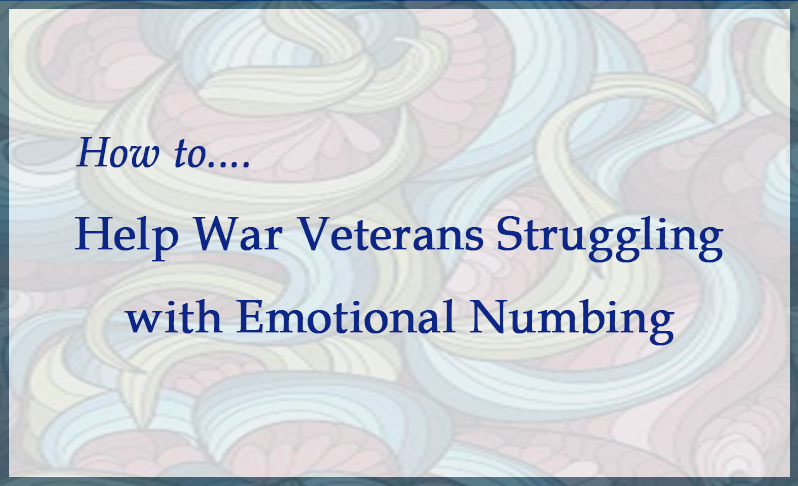“There is quiet. The quiet when he was gone, away in Afghanistan. Or this new quiet, now, now that he is home.”
— Amalie Flynn, Wife and War
Silence has multiple textures just as emotional numbing is not only one thing. We have known about emotional numbing for as long as we have known about war, but it is only recently that it is being openly discussed. This, in itself, is a victory.
When my father came home from war no one said anything. Silence was considered the protective shield but it protected no one. Violence, fear and terror, the very things my father had lived with during his service, inhabited our home and as a youngster I was left with the impossible task of making sense of it. Everyone was too shocked to speak. This is what compels me to write about emotional numbing. I want to build a fire of awakening so that adults will find avenues of communication, even when they seem to be invisible.
The Need for a Mutual Language
The gap between what soldiers experience and what a families experience during deployment becomes a widening chasm, especially when deployments are repeated. We need to discover a mutual language so that people who were once so intimate can restore their ability to dialogue. Though everyone is different the core love that brought them together is the same; it is still alive. That is the heat source we need.
Emotional numbing may actually be an inability to find words to match experiences. Family members can be struggling with this as much as veterans. Through the process of daily living we can maximize our opportunities to discern, observe, and bear witness at home in a much more comprehensive way than any well-meaning outsider. Even experts with the best of intentions do not have the insight that family members can gain into the unique characteristics of each individual living with how war comes home.
Bearing witness means not letting the fear of silence outweigh awareness. Be a witness to the dynamics between you and your veteran, or between a veteran and family members. Observe without analysis or even interpretation. Observe yourself as well as others. Ask yourself if there is truly an absence of feeling or an absence of language? The distinction is important. It will shape the pace and method of recovery.
Struggling to Find Words
If the issue is a struggle to find words, your greatest ally is love-infused spaciousness and patience. Trauma pioneer Dr. Henry Krystal called this condition, which I would say is an aspect of shock: alexitheymia. Indeed there is not language to express the magnitude of horror that combat survivors have seen and experienced. Because heretofore silence was the singular, dominant tool for the enormity of war experience, we have few models for expression. We all deserve compassion and time to find our words, and the encouragement that they are worth waiting for.
On the other hand, there may actually be an absence or a reduction of, such as a less or no enjoyment in activities that were once pleasurable. It is worthwhile to note here the difference between emotional numbing and depression. Depression includes disinterest, exhaustion and no motivation. Emotional numbing is different. It is a blunted sense of feeling, as if someone had turned the sound volume down very low. One can still be motivated and functional; there is just a limited access to feeling. This is a form of avoidance and self-protection that may, for the time being, be necessary.
There is no specific treatment for emotional numbing and no medication for it. However if the cause is difficulty finding words family members can help melt the ice in a variety of ways such as speaking without expectation, inviting participation without demanding it and encouraging honest exchange while giving the individual the space they need to find their way. Think of what happens when your arm or leg becomes numb. If you try to evoke movement from it too quickly the limb will crumble under you. If you gently coax it back to its former resilience, it will respond by remembering what it is like to be fully alive.
Emotional numbing with an absence of feeling has been identified by Dr. Frank Ochberg as having the characteristics of high anxiety and low mood. The low volume on feeling does not apply to anxiety. In fact, there may be high anxiety specifically because of the lack of feeling. In this case, mirroring language really helps, like: “Even though you seem remote, I can sense that you care.” These reassuring statements can jumpstart the meltdown.
Creating Conditions to Help
Combat veterans may still be going through check-points at home for a long time before they cross the check-point that tells them that finally they are safe. Regardless of the nature of the emotional numbing there are many ways that families can create conditions to help the glacial melt occur incrementally so that flooding is avoided. These include warm and non-intrusive gatherings (no probing questions), sharing in spiritual practices like prayer, enjoying music and fun together, hikes in nature and healthy exercise.
Emotional numbing claims families just as combat claims lives. Amalie Flynn’s book Wife and War portrays an authentic, organic defrosting process with unflinching honesty. We have the power in our own homes, through our love and awareness, to fill in the chasm that separates soldiers from those who have not seen combat and to reach out to each other from the heart of compassion and in the spirit of continuity. I do not have a brilliant one-size-fits-all formula to make this happen but I do have skillful means to access presence, faith and love. I believe that for those of us blessed to be alive and together, we can build the capacity to find connection again.
Download Your Free eBook
In cooperation with New Forums Press, I have developed an eBook for families, Talking to Warriors: Dialogues between Veterans and Family Members. It is free. You may download the specially-prepared title by clicking here: TTWtext.
The Author
 Dr. Stephanie Mines is a psychologist whose unique understanding comes from her academic research as well as her extensive work in the field. Her stories of personal transformation have led many listeners to become deeply committed to the healing journey. Dr. Mines understands shock from every conceivable perspective. She has investigated it as a survivor, a professional, a healthcare provider, and as a trainer of staffs of institutions and agencies. Meet Stephanie.
Dr. Stephanie Mines is a psychologist whose unique understanding comes from her academic research as well as her extensive work in the field. Her stories of personal transformation have led many listeners to become deeply committed to the healing journey. Dr. Mines understands shock from every conceivable perspective. She has investigated it as a survivor, a professional, a healthcare provider, and as a trainer of staffs of institutions and agencies. Meet Stephanie.



